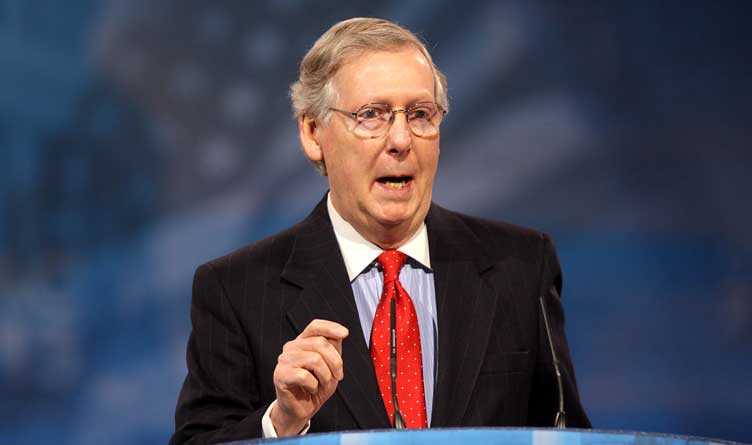H.R. 1 Would Sow Discord Among The Population While Serving To Entrench Those Currently In Power By Stifling Free Expression. There Are Many Ways To Heal The Divisions In Our Society. H.R. 1 Would Accomplish The Exact Opposite, Treating Political Activism As A Dirty Endeavor While Painting A Bright Red Target On The Backs Of Those Who Do Partake. Neither Party Is Innocent In Sowing Rancor And Discord. And Both Can And Must Do Better By Uniformly Rejecting H.R. 1and Moving To Mend The Bitter Divide.
Photo: Then Majority Leader Mitch McConnell did not allow H.R. 1 to come to the floor in 2019.
Photo Credit: Gage Skidmore / Flickr
Published March 4, 2021
By Daniel Savickas [Taxpayer Protection Alliance via The Center Square] –
In 1958, the United States Supreme Court ruled unanimously in NAACP v. Alabama that the state of Alabama’s proposal to force the NAACP to reveal their membership lists violated the organization’s due process rights under the Fourteenth Amendment.
This case is still hailed today as a landmark decision for civil rights and privacy.
Unfortunately, the spirit of that decision has come under threat in Washington. The proposed government reform bill H.R. 1, cynically named the “For the People” Act, would force all political organizations to disclose private donor information to the government.
Justice Marshall Harlan II delivered the opinion of the court in that case, saying, “Immunity from state scrutiny of petitioner’s membership lists is here so related to the right of petitioner’s members to pursue their lawful private interests privately and to associate freely with others in doing so as to come within the protection of the Fourteenth Amendment.”
Today, there are thousands of interest groups across the United States striving to advance their lawful private interests. Scores of people across the political spectrum donate to these groups and causes knowing that their resources are more efficiently pooled together.
And, not everyone is cut out to be on the front line of whatever political or social battle is at hand, especially given the bitter divisiveness in the nation today. That is why anonymity is an important aspect of not only the Fourteenth Amendment, but also the First Amendment.
The First Amendment declares that the government may not abridge the right to lawful speech. It does not make any stipulations that the speakers name themselves and submit their personal information to governing authorities.
In fact, some of our country’s framers did their best work under the precious cloak of anonymity. A good many of the documents that formed the way government is viewed even today were written under pseudonyms. Most famously, Alexander Hamilton, John Jay, and James Madison wrote the Federalist Papers under the collective name, “Publius.”
The need and desire for anonymity is not as distant as 1787 or even 1958.
As recently as 2013, the Internal Revenue Service (IRS) came under scrutiny for having targeted conservative groups. These groups were subject to intensive investigations by the IRS merely for having conservative or libertarian phrases in their organization’s name or mission statement.
Imagine if these groups had been simultaneously forced to disclose the personal information of their members and donors. The government has demonstrated it is not above targeting its citizens for political reasons. There is no reason to trust they won’t do so again.
We are no more than a few years removed from Rep Maxine Waters (D-Calif.) encouraging her supporters to physically confront Trump administration cabinet officials.
The country still remembers Rep. Steve Scalise (R-La.) being shot on a baseball field by a former democratic campaign volunteer.
Prior to the confirmation of Justice Kavanaugh to the Supreme Court in 2018, senators were cornered by protesters in their office buildings and in elevators in hopes of stalling the vote.
And of course, there was the debacle on January 6 of this year in which protestors stormed the Capitol Building trying to invalidate the Electoral College.
There is no shortage of pent up political anger in this country. The government and private citizens alike have shown there is no longer much demand for restraining that anger.
Thankfully, cabinet officials and members of Congress have brave, capable security details at their disposal. Everyday Americans are not so fortunate. Exposing the personal information of millions of political activists across the country is irresponsible beyond words given what has transpired in just the last few years.
H.R. 1 would sow discord among the population while serving to entrench those currently in power by stifling free expression.
There are many ways to heal the divisions in our society.
H.R. 1 would accomplish the exact opposite, treating political activism as a dirty endeavor while painting a bright red target on the backs of those who do partake. Neither party is innocent in sowing rancor and discord. And both can and must do better by uniformly rejecting H.R. 1and moving to mend the bitter divide.

About the Author:
Daniel Savickas is a policy analyst for the Taxpayers Protection Alliance.




